Sustainability-Focused Consulting
Focusing on sustainability is becoming a higher executive priority across the global business landscape, particularly around ESG principles. Corporate accountability for social good and contribution, internally and externally, support growth in the medium and long-term.
Through NRI’s sustainability-focused consulting, we see three managerial results: competition strategy, risk hedging, and loyalty engagement. In harnessing our wealth of sustainability expertise, we support clients achieve sustainable growth.
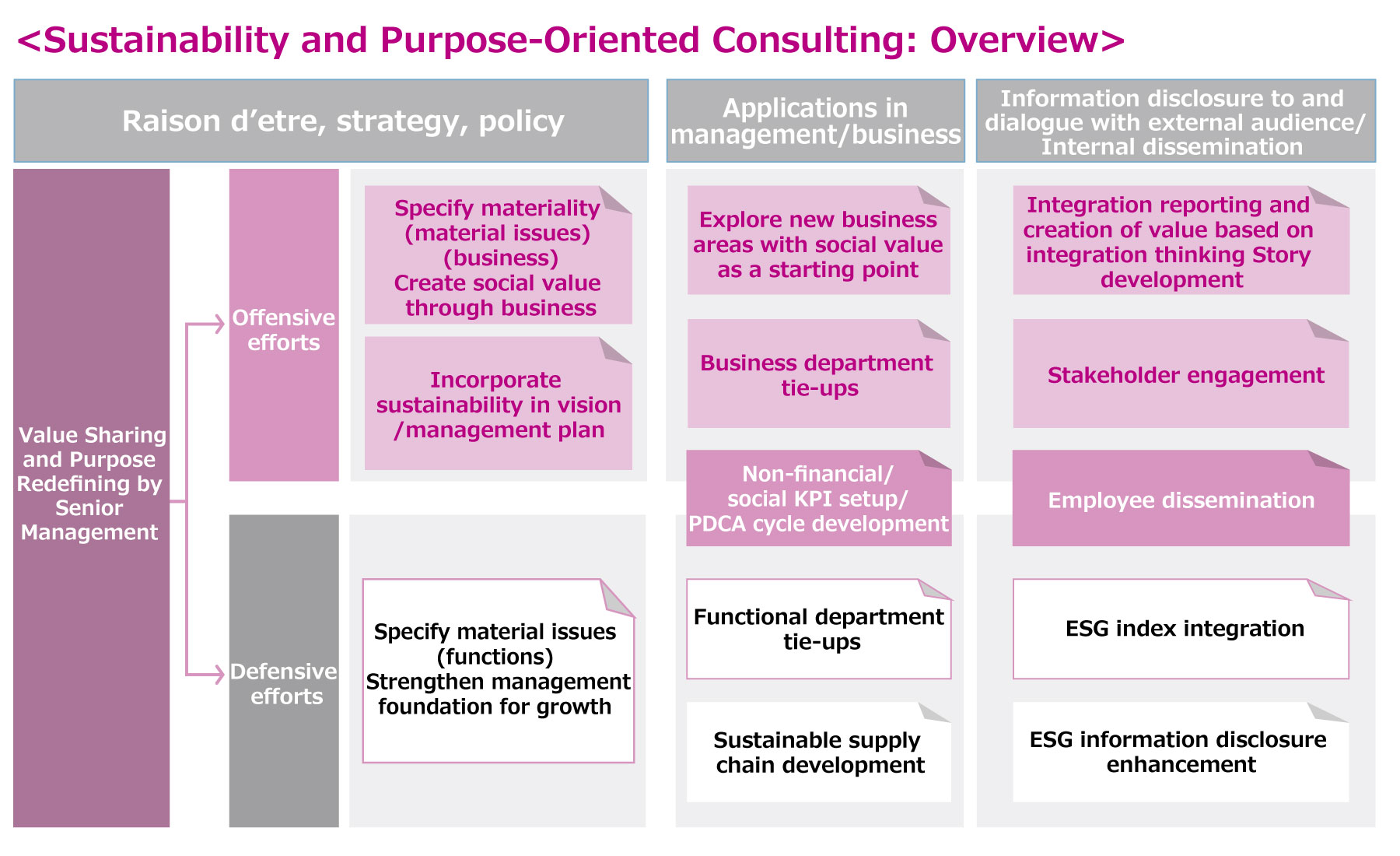
01. Purpose-Focused Management Helps Accelerate Strategy Implementation (Philosophy / Dissemination among Employees)
Purpose-focused consulting redefines the enterprise/organization’s reason for existence and helps establish shared value
By providing an enterprise environment where each employee revisits, redefines, and shares their
“reason for existence” in society, the enterprise can build strong support for a sustainable
strategy. NRI assists clients with purpose-focused consulting, through which the purpose of an
enterprise/organization is redefined and a shared value is widely established.
Against the backdrop of public expectations concerning the social presence of enterprises,
particularly from sustainability-conscious millennials, the perception of companies as “social
entities” is increasing significantly.
Employees, who are tasked with carrying out company strategies, can serve as a mouthpiece to support corporate social responsibility if they are in an environment that they feel has a positive impact that they take pride in.
02. Develop a Sustainable Management Framework (Vision, Management Plan)
Long-term growth and social value
Momentum is growing for Japanese companies to shift towards sustainability-oriented management. This shift brings with it a range of changes in the area of operations of corporate management that vary across sectors and business formats.
At NRI, we support sustainable growth through incorporating sustainability elements into management and business, including core corporate sustainability.
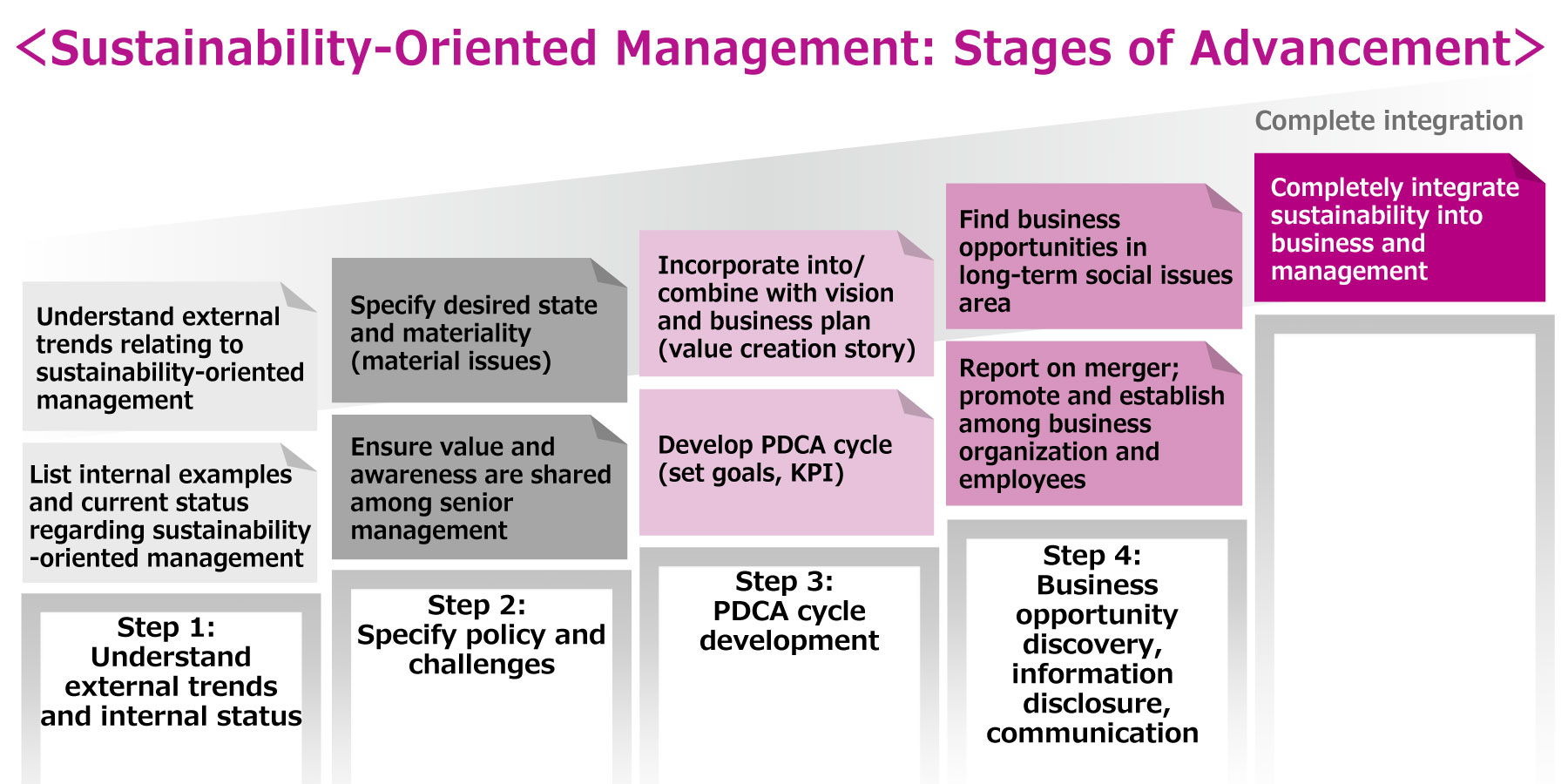
Incorporate the concept of sustainability at the foundation of management, and build a “sustainable management framework”
Sustainability-oriented management is drastically different from the conventional corporate social responsibility concept in its strategy development techniques and implementation methodology. By incorporating sustainability into the management framework, companies can create future sustainable growth.
03. Determine Integrated Materiality
Value-creation stories to engage in more effective and sustainable activities
Many Japanese companies have shown greater interest in integrated reporting and began examining how to determine materiality (material societal issues that have a significant impact on decision-making) and to develop a related value-creation story.
We at NRI utilize our knowledge of strategy development to provide our clients services for determining materiality and developing value-creation stories from a strategic perspective of our clients’ business developments and social trends.
NRI has built its own examination framework and process for establishing materiality that looks at a company’s functions and business separately. The involvement of function and business departments is essential for establishing highly efficient materiality and developing a value-creation story designed to be disclosed in an integrated report.
NRI works to establish materiality and develop value-creation stories by proposing the involvement of pertinent departments, cross-organizational tie-ups, and other processes intended for dissemination to society, and providing close support to clients in implementation.
04. Communicate Value Creation to Investors
Reporting to stakeholders based on “true integrated thinking”
In Japan, an increasing number of companies are switching to integrated reporting and seeking to
enhance the quality of their reports. The true aim of integrated reporting is to demonstrate a
narrative of the value created in the long term through “corporate integrated thinking” through the
integration of financial and nonfinancial capitals with corporate management※. Companies need to
communicate with investors in a clear and effective manner that they have the capability to continue
creating value over the long term.
We at NRI provide strong support to clients with the goal of achieving integrated reporting based on
true integrated thinking.
※Per IIRC (International Integrated Reporting Council)
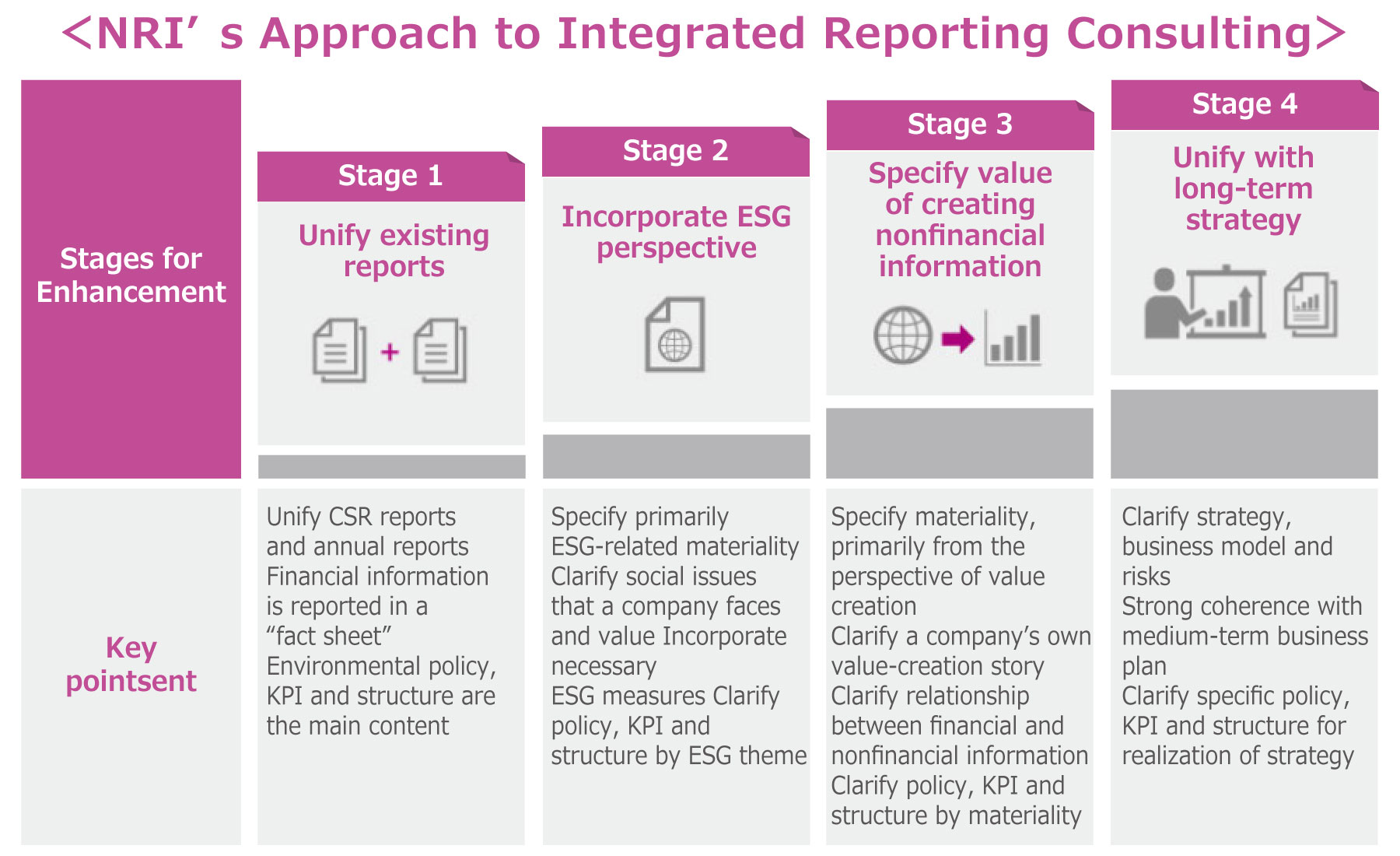
To express true integrated thinking, it is necessary to clarify the association between financial
and nonfinancial information and it is important to build a story that appropriately communicates
value creation to investors.
At the implementation stage, the value provided to society is identified and specified, and the
connection of nonfinancial activity with value creation is examined and incorporated into a report.
05. Achieve Strategic ESG Information Disclosure
Effective information disclosure to assessment organizations and stakeholders
The momentum for ESG investing is growing in recent years, but Japan is still lagging behind other markets like the EU. However, in 2017 Japan’s Government Pension Investment Fund (GPIF) began passive investment linked to ESG indexes, which spurred stronger interest for ESG investment. The urgent challenge for companies is to disclose and communicate their current conditions to investors and other stakeholders more effectively.
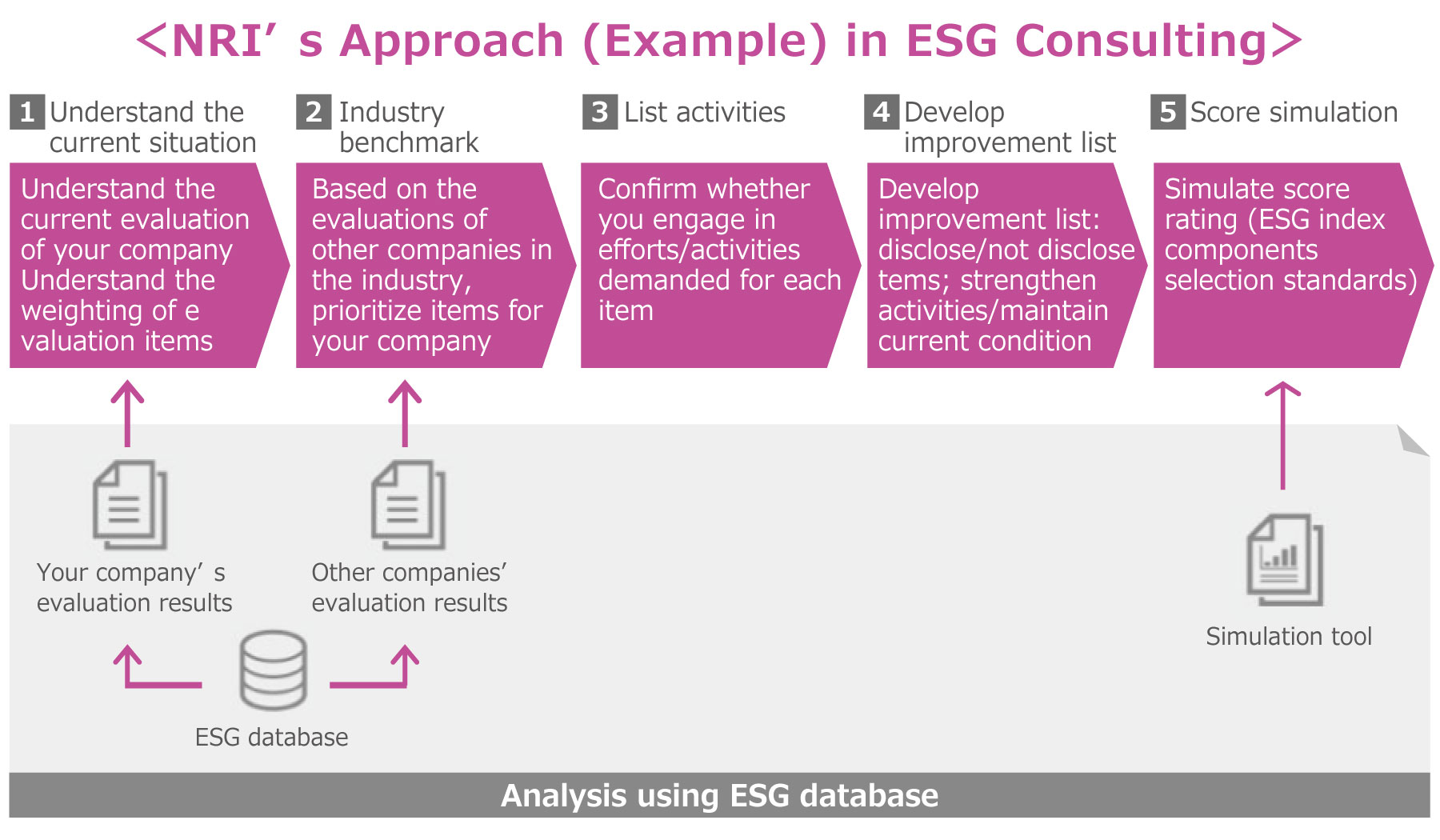
To effectively handle a wide range of ESG information, it is necessary to understand the current standards and identify high-priority issues. At NRI, we use the ESG evaluation index database as a basis to systematically list:
- Responses specific to industry and country
- The position of your company compared with others
- Priority issues going forward
We then analyze and assess them in order to examine with a client the desirable approach and action
plan for that client.
At the stage of implementation we propose measures to improve evaluation scores, develop an action
plan that includes advice for enhancing the efficiency of ESG information disclosure, and otherwise
provide close support for implementation.
06. Develop a Sustainable Supply Chain
Addressing supply chain risks and creating opportunities
Addressing unexpected supply-chain risk concerning sustainability is an urgent issue.. Insufficient
handling of social responsibility matters, including human rights and the environment, means courting
risk that will develop into an event with significant impact on a company across management levels and
business lines.
However, it is difficult for a company to address all the supply chain-related risks in an optimal
manner. Thus, it is necessary to look at supply chain risks and opportunities and identify high-priority
issues that should be addressed for development of a sustainable supply chain. We at NRI support clients
with strategy consulting to create these opportunities.
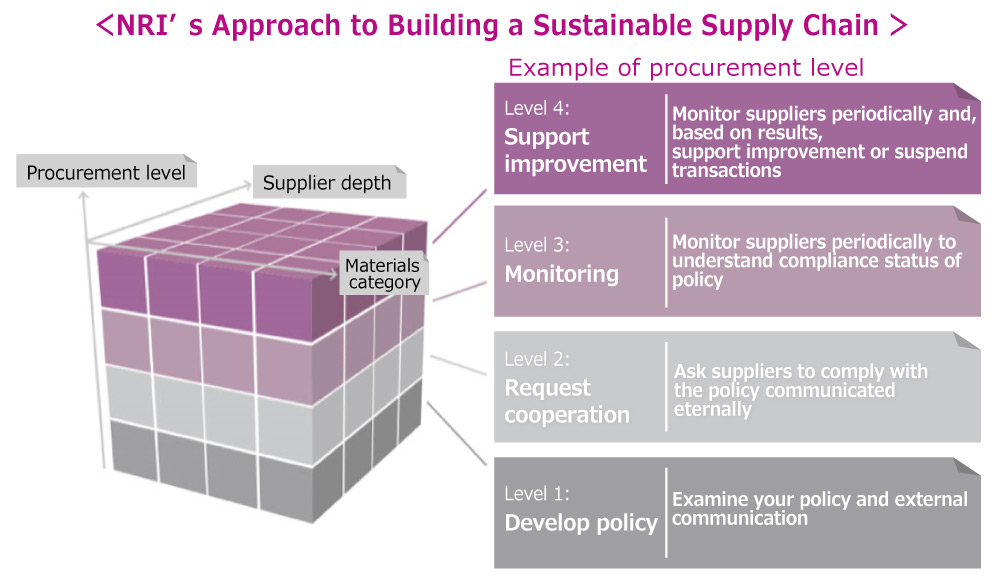
At NRI, we analyze high-priority themes, business partners, materials and markets based on our framework and examine the approach and action plan desirable for a specific client. At the implementation stage, we provide close support for implementation of the action plan, including how to approach suppliers.